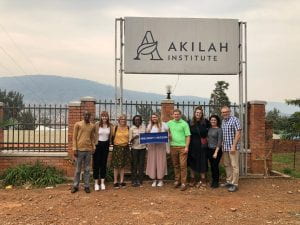Ubumuntu—Humanity.
I took a class this past semester surrounding Postmodern American Literature and History, and after we finished each novel, we always asked the question: “Is this novel hopeful?”
Now, if you know ANYTHING about Postmodern literature, you probably know that themes tend to lean towards the brokenness and darkness of our complicated realities, so finding seeds of hope tends to be a difficult task. But, regardless of the novel and its tragic ending, we always concluded that, yes, there is hope. Because something always had to persist, whether it be a character, an idea, a dream, or just the fact that the author chose to write the story in the first place for others to remember—to have the tale endure as to not be forgotten to the oblivion of history—is in itself hopeful. If one thing is able to escape the darkness, it is a victory for humanity, and the Rwandan community has taken that belief and ran with it.
This is what’s been consuming my thoughts as I’ve begun to process the magnitude of what happened 25 years ago—what has persisted and kept affected Rwandans hopeful? Because, you see, the way that the Rwandan Genocide differs from the Holocaust is the distance from violence. The Nazis attempted to remove themselves as far as possible from the conflict, performing mass killings in gas chambers and death camps scattered around countries outside of Germany. In Rwanda, the Hutu people set out to kill their Tutsi neighbors and family members, and they succeeded… to a degree. Yes, one million lives were lost in the most horrific way, but a man whom we spent quite a bit of time with here and who survived the Genocide as a young boy, Edward Makara, made a great point early on in our trip by saying something along the lines of, “They tried to kill us all, the Nazis tried to kill all the Jews, but when will they learn that it never works? It never has worked! We always come back and survive.”
Before visiting any of the genocide memorials, our group visited an organization called ‘Never Again Rwanda.’ NAR’s mission is to work with youth in peace building and reconciliation. We spent over an hour learning about the methods, beliefs, and goals of the organization—how to deal with soon-to-be released perpetrators of the Genocide, educational programs for disadvantaged youth, and mental health initiatives (to name a few). Once we concluded our meeting, the man who we talked with asked what our plans were for the rest of our stay. When we told him of our plans to visit the Nyamata Genocide Memorial—a church where 10,000 people took refuge from the Hutu but were still killed—he then told us that he had been there. He had laid under a broken bench (we realized there was only one upon visiting) as bodies piled up around him and hid him from his persecutors.
He had been around 6 years old.

I don’t think my heart has ever hit the ground faster—and we hadn’t even visited the memorial yet at that point. I don’t know what I found more compelling—the fact that he survived, or the fact that he was dedicating his time and effort to work at preventing future genocides. NAR has plans to work with recently released perpetrators and their families in readjusting to life after their release. How could he forgive them? How could he look them in the eye and equip them with tools and strategies to prosper?
And then I realized that was the humanity. The persistence of a little boy who survived a horrendous massacre, forgiving those who hurt him and countless others, in the hopes of bettering the world and Rwanda for the next generation. So that they would never have to see the horror that he saw.
That’s what it takes. One person, one spark, to inspire hope into a broken nation torn apart from the inside out. And of course it is more complicated than that. This transition to forgiveness didn’t happen overnight or at the snap of his fingers, but IT HAPPENED. And I wish I had the vocabulary to enforce just how powerful and courageous I think that is. What I’ve seen is that when ubumuntu is fostered in just ONE person, it can lead toward the reconciliation of a whole group, or even a whole nation. And I would say that’s pretty hopeful.
We always come back and survive.
Submitted by Lauren Weaver
